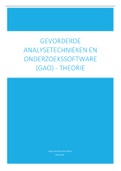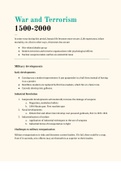Lecture 1 - introduction
Criminal law : life, death, freedom, safety, integrity
Everyone, even criminals, have rights to be defended.
Aim is to maintain and restore the order in society and to prevent lynch law
To protect the society from harmful and dangerous behaviour.
Provides certain amount of predictability
Criminal law is created by :
State / federal legislator
Lower legislators (municipalities)
Supranational legislators (EU)
Criminal courts (in common law countries)
Substantive criminal law: Body of the rules to determine how one has to behave
- Determines which behaviour is to be regarded as criminal and in which ways the
authorities can respond to these acts
Ex. Which sanctions can be imposed, under what circumstances are acts
considered criminal?
Criminal acts divided into 2 categories
- Mala in se - Evil in itself , (wrong by nature ; murder,rape…)
- Mala prohibita - wrong because prohibited by law , more aimed to regulating
society (drivers who not possess a driver license)
Criminal procedure : The formal steps that taken to enforce substantive criminal law
Investigation (interrogations and search) , trial , appeal
Main Sources of criminal law
- Criminal Codes
- Acts of Parliament / Congress (statues)
- Case law
- Treaties and international regulations
- Doctrines (scholarly writings : Case notes)
- General principles of law
*Common law systems (English and US) - uncodified , categorised case by case , judges
decision is effective on shaping the law
,**in practice Dutch courts do follow the decisions of the supreme court
Criminal courts
National Level
1. Lower Court
2. Courts of appeal
3. Supreme court
Human rights court
● Africa - Tanzania
● Europe - Strasbourg,France
● Americas - Costa Rica
International Level
● ICC
● Criminal tributes ICTY, ICTR
Functions of criminal law
Why do we need criminal law? : To maintain and restore order in society - it is used as
an instrument to protect society from harmful and dangerous human behaviour. Criminal
law also provide us with a certain predictability. Ex. people know what to expect from
each other which creates some certainty.
Declaratory (bildirici) - society has certain norms by which we have to abide by in order
to protect our values and interests. By imposing sanctions for infringing those norms, we
stress the importance of these values and interests that we cherish in society
Preventive (önleyici) - Prevent potential crimes “think twice before act” - sanctions have
a deterring effect on people-
Censuring (kınama) - Punishment - expression of strong disapproval
3 views of punishment
i) Retributive theory
ii) Utilitarian theory
iii) Hybrid theory
, Aims of punishment (1-2 retributive , 3-4-5 utilitarian)
1. Retribution
2. Incapacitation
3. Deterrence (general and specific) Caydırıcılık
4. Rehabilitation
5. Restoration
Conditions for criminal liability
1. Act - a willed,voluntary act , physical conduct 1 , the act must fall to a legal definition of
a criminal offence in a certain country = actus reus , must be done by people of a
certain age 2 Volitional act : a choice or decision made
2. Causation- act and consequence- no causation , no criminal liability - Nedensellik
3 theories that distinguish the causal link :
Conditio sine qua non : if the act did not occur , the result would have not happened
(chain of events)
Proximate cause : most proximate act to the result is the relevant cause
Adequate causation : ‘was the result foreseeable?’
3. Fault mens rea - defendant must have acted with a “guilty mind” . (Direct intent)
4. Wrongdoing =No justification, under certain circumstances an act can be justified it
may be harmful but not considered wrong , ex; self defence
5. Blameworthiness =No excuses, under certain circumstances a defendant may be
excused on grounds of insanity ex ; duress or involuntary intoxication
(baskı,tehtid,drugged, convinced, lost in touch with reality) if there is a legal excuse the
defendant did not act blameworthy
Jurisdiction : Government's power to exercise authority over all persons and things
within its territory , A court's power to decide a case
1 Hayvanlar criminal act işleyemez.
Min. age for criminal responsibility depends on the countries ( Hollanda’da ve Türkiye'de 12 ,
UK- Wales 10 Pakistan,Qatar,UAE 7, İran 9 kız 15 erkek)
2 Bir kişi bilinçsiz bir şekilde bir suç işlerse sayılmaz , willed/voluntary act kriterine girmiyor (ex.
Nöbet geçirirken birini yaralamak)
, Ex : An Indian man who lives in the US assaults a Dutch woman on a Turkish THY
Flight from Washington DC to Istanbul.
Which of these countries claim jurisdiction ? - Türkiye çünkü THY uçuşu.
Territorial jurisdiction : a state can claim jurisdiction with all criminal offences
committed on its territory. Applies to All airplanes and shifts registered on that territory.
Extraterritorial jurisdiction : (outside of its borders)
- Nationality principle : state may exercise jurisdiction within their citizens regardless of
where they are
i) active nationality the conduct is state’s national
ii) passive nationality the victim is state’s national
- Universality principle : serious international crimes regardless where it is committed
and nationality of the defendant ( ex. slave trading ) also can be limited by dual
criminality.
Double criminality / Dual criminality
The particular act must constitute a crime in both jurisdictions (the jurisdiction where the
crime is committed and the defendant is put on trial). Depends largely on the domestic
provisions of the state whether is applicable
Lecture 2 - Criminalisation
Criminalisation : the process of which behaviours and individuals become crimes and
criminals
Content of criminal law depends on society values.
+ Regional and temporal differences , values can be different across societies, but they can
also shift over time
Theories of criminalisation
- Utilitarian : criminalisation for the greater good
This can however lead to excessive results - what may be for the greater good might
result in great harm for certain individuals
Criminal law : life, death, freedom, safety, integrity
Everyone, even criminals, have rights to be defended.
Aim is to maintain and restore the order in society and to prevent lynch law
To protect the society from harmful and dangerous behaviour.
Provides certain amount of predictability
Criminal law is created by :
State / federal legislator
Lower legislators (municipalities)
Supranational legislators (EU)
Criminal courts (in common law countries)
Substantive criminal law: Body of the rules to determine how one has to behave
- Determines which behaviour is to be regarded as criminal and in which ways the
authorities can respond to these acts
Ex. Which sanctions can be imposed, under what circumstances are acts
considered criminal?
Criminal acts divided into 2 categories
- Mala in se - Evil in itself , (wrong by nature ; murder,rape…)
- Mala prohibita - wrong because prohibited by law , more aimed to regulating
society (drivers who not possess a driver license)
Criminal procedure : The formal steps that taken to enforce substantive criminal law
Investigation (interrogations and search) , trial , appeal
Main Sources of criminal law
- Criminal Codes
- Acts of Parliament / Congress (statues)
- Case law
- Treaties and international regulations
- Doctrines (scholarly writings : Case notes)
- General principles of law
*Common law systems (English and US) - uncodified , categorised case by case , judges
decision is effective on shaping the law
,**in practice Dutch courts do follow the decisions of the supreme court
Criminal courts
National Level
1. Lower Court
2. Courts of appeal
3. Supreme court
Human rights court
● Africa - Tanzania
● Europe - Strasbourg,France
● Americas - Costa Rica
International Level
● ICC
● Criminal tributes ICTY, ICTR
Functions of criminal law
Why do we need criminal law? : To maintain and restore order in society - it is used as
an instrument to protect society from harmful and dangerous human behaviour. Criminal
law also provide us with a certain predictability. Ex. people know what to expect from
each other which creates some certainty.
Declaratory (bildirici) - society has certain norms by which we have to abide by in order
to protect our values and interests. By imposing sanctions for infringing those norms, we
stress the importance of these values and interests that we cherish in society
Preventive (önleyici) - Prevent potential crimes “think twice before act” - sanctions have
a deterring effect on people-
Censuring (kınama) - Punishment - expression of strong disapproval
3 views of punishment
i) Retributive theory
ii) Utilitarian theory
iii) Hybrid theory
, Aims of punishment (1-2 retributive , 3-4-5 utilitarian)
1. Retribution
2. Incapacitation
3. Deterrence (general and specific) Caydırıcılık
4. Rehabilitation
5. Restoration
Conditions for criminal liability
1. Act - a willed,voluntary act , physical conduct 1 , the act must fall to a legal definition of
a criminal offence in a certain country = actus reus , must be done by people of a
certain age 2 Volitional act : a choice or decision made
2. Causation- act and consequence- no causation , no criminal liability - Nedensellik
3 theories that distinguish the causal link :
Conditio sine qua non : if the act did not occur , the result would have not happened
(chain of events)
Proximate cause : most proximate act to the result is the relevant cause
Adequate causation : ‘was the result foreseeable?’
3. Fault mens rea - defendant must have acted with a “guilty mind” . (Direct intent)
4. Wrongdoing =No justification, under certain circumstances an act can be justified it
may be harmful but not considered wrong , ex; self defence
5. Blameworthiness =No excuses, under certain circumstances a defendant may be
excused on grounds of insanity ex ; duress or involuntary intoxication
(baskı,tehtid,drugged, convinced, lost in touch with reality) if there is a legal excuse the
defendant did not act blameworthy
Jurisdiction : Government's power to exercise authority over all persons and things
within its territory , A court's power to decide a case
1 Hayvanlar criminal act işleyemez.
Min. age for criminal responsibility depends on the countries ( Hollanda’da ve Türkiye'de 12 ,
UK- Wales 10 Pakistan,Qatar,UAE 7, İran 9 kız 15 erkek)
2 Bir kişi bilinçsiz bir şekilde bir suç işlerse sayılmaz , willed/voluntary act kriterine girmiyor (ex.
Nöbet geçirirken birini yaralamak)
, Ex : An Indian man who lives in the US assaults a Dutch woman on a Turkish THY
Flight from Washington DC to Istanbul.
Which of these countries claim jurisdiction ? - Türkiye çünkü THY uçuşu.
Territorial jurisdiction : a state can claim jurisdiction with all criminal offences
committed on its territory. Applies to All airplanes and shifts registered on that territory.
Extraterritorial jurisdiction : (outside of its borders)
- Nationality principle : state may exercise jurisdiction within their citizens regardless of
where they are
i) active nationality the conduct is state’s national
ii) passive nationality the victim is state’s national
- Universality principle : serious international crimes regardless where it is committed
and nationality of the defendant ( ex. slave trading ) also can be limited by dual
criminality.
Double criminality / Dual criminality
The particular act must constitute a crime in both jurisdictions (the jurisdiction where the
crime is committed and the defendant is put on trial). Depends largely on the domestic
provisions of the state whether is applicable
Lecture 2 - Criminalisation
Criminalisation : the process of which behaviours and individuals become crimes and
criminals
Content of criminal law depends on society values.
+ Regional and temporal differences , values can be different across societies, but they can
also shift over time
Theories of criminalisation
- Utilitarian : criminalisation for the greater good
This can however lead to excessive results - what may be for the greater good might
result in great harm for certain individuals










